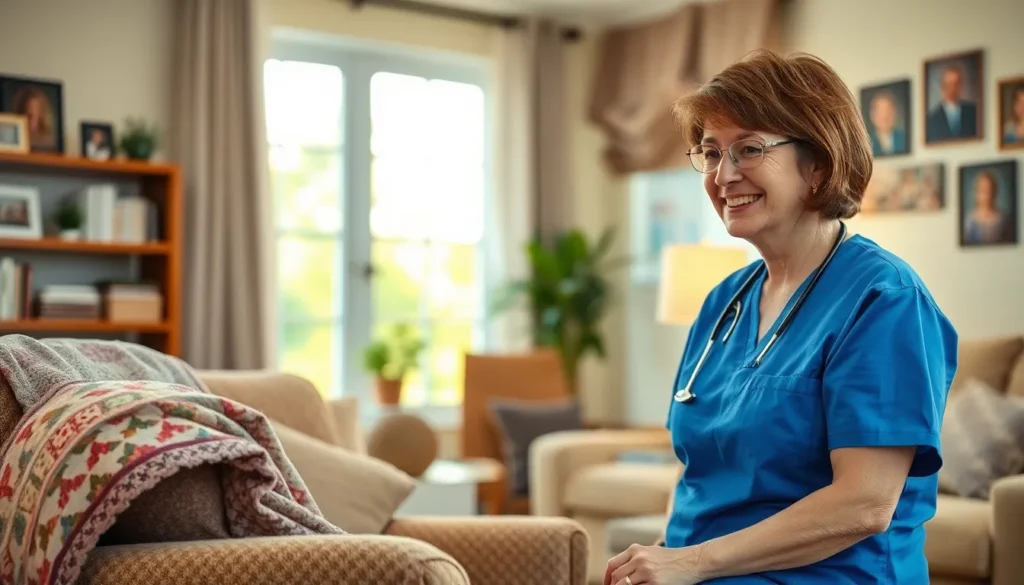Table of Contents
ToggleIn a world where life never seems to hit the pause button, the need for around-the-clock in-home care has never been more essential. Imagine having a personal superhero who’s always ready to swoop in and save the day—whether it’s helping with daily chores, providing companionship, or ensuring safety. It’s like having a trusty sidekick who never sleeps, minus the cape and spandex.
But let’s face it, juggling work, family, and personal time can feel like trying to balance a flaming sword on a unicycle. That’s where around-the-clock care comes in, offering peace of mind for families and a helping hand for loved ones. With this kind of support, everyone can thrive, and maybe even find time for that long-awaited nap. So, let’s explore how this invaluable service can transform lives and make everyday challenges a breeze.
Understanding Around The Clock In Home Care
Around-the-clock in-home care provides essential support to individuals who require continual assistance. This type of care enhances independence while ensuring safety and comfort.
Definition of Around The Clock Care
Around-the-clock care refers to continuous assistance from trained caregivers, available 24 hours a day. This support addresses daily living activities such as bathing, meal preparation, and medication management. It’s not limited to specific services; caregivers can also offer companionship, emotional support, and supervision. Families often seek this service to ensure loved ones receive consistent attention and assistance when they need it most. Customized care plans allow caregivers to meet individual needs, ensuring a holistic approach to health and well-being.
Importance of Continuous Support
Continuous support proves vital for individuals with chronic illnesses, disabilities, or age-related challenges. Around-the-clock care ensures that assistance is available whenever necessary, reducing the risk of accidents or emergencies. Timely interventions can significantly improve health outcomes and maintain a higher quality of life. Families experience less stress knowing trained professionals are present to handle daily tasks and provide companionship. This reliable support not only enhances the emotional well-being of individuals but also offers peace of mind to families juggling other responsibilities. Effective care fosters a safer, more comfortable living environment, promoting independence and dignity.
Benefits of Around The Clock In Home Care

Around-the-clock in-home care offers numerous advantages that enhance the quality of life for individuals in need of assistance. This type of care prioritizes safety and personalized support.
Enhanced Safety and Security
Around-the-clock care ensures a safe environment for individuals, significantly reducing the risk of accidents at home. Caregivers monitor movements and provide immediate help, especially during nighttime hours. Continuous supervision keeps individuals secure, offering reassurance to family members. This vigilant presence enhances the well-being of loved ones and promotes independence, allowing individuals to trust their space. Procedures for emergency situations are readily in place. Trained caregivers respond quickly to changes in health status, ensuring timely medical intervention when necessary.
Personalized Attention and Care
Tailored care plans meet unique and specific needs of individuals. Around-the-clock caregivers develop customized approaches based on personal preferences and health requirements. Each interaction provides meaningful companionship, which fosters emotional well-being and reduces feelings of loneliness. Activities and routines adapt to individual schedules, respecting both privacy and personal choice. Continuous engagement promotes mental stimulation, reflecting the individual’s interests. Care preferences evolve, making it easier to adjust to life changes while receiving support that prioritizes dignity and comfort.
Types of Services Included
Around-the-clock in-home care offers a variety of essential services tailored to meet individual needs.
Skilled Nursing Care
Skilled nursing care includes medical treatments and monitoring provided by licensed professionals. Trained nurses administer medications, manage chronic conditions, and perform wound care. Care plans accommodate specific medical requirements, ensuring patients receive personalized attention. Regular assessments monitor health status, adjusting care as needed for optimal outcomes. Communication between caregivers and families strengthens understanding and coordination. Overall, skilled nursing care enhances comfort and promotes better health.
Personal Care Assistance
Personal care assistance focuses on daily living activities that support individual independence. Caregivers assist with bathing, dressing, grooming, and mobility, empowering clients to maintain dignity. Meal preparation ensures nutritional needs are met, while companionship reduces feelings of loneliness. Safety supervision minimizes the risk of falls and provides instant help in emergencies. Comprehensive personal care fosters emotional well-being and improves overall quality of life, making every day a little easier and more enjoyable.
Choosing the Right Provider
Selecting a provider for around-the-clock in-home care requires careful consideration. Families should prioritize quality and compatibility with individual needs.
Factors to Consider
Assessing caregiver qualifications is crucial. Look for certified professionals with experience in specific medical conditions or disabilities. Availability is another key factor. Providers should offer flexible scheduling to meet the patient’s needs, ensuring continuous support. Company reputation matters significantly. Research online reviews and ask for referrals from trusted sources. Lastly, evaluate the level of personalized care offered. Customized care plans ensure that services align with individual preferences and medical requirements.
Questions to Ask Potential Providers
Discussing experience with similar cases can provide insight into the provider’s capabilities. Inquire about staff training and certification to ensure caregivers possess necessary skills. Clarifying communication methods is also important. Understanding how caregivers will update families on care progress fosters trust. Questions about emergency protocols reveal the provider’s preparedness for unexpected situations. Don’t forget to ask about the process for adjusting care plans, ensuring they can adapt services as needs change.
Around-the-clock in-home care stands as a vital resource for individuals needing consistent support. This type of care not only enhances safety and independence but also fosters a sense of companionship and emotional well-being. Families can find peace of mind knowing that trained caregivers are available to assist with daily tasks and provide supervision.
Choosing the right provider is crucial to ensuring that care is tailored to individual needs. By prioritizing quality and compatibility, families can create a supportive environment that promotes dignity and comfort. Ultimately, around-the-clock in-home care transforms lives, allowing individuals to thrive in their own homes while receiving the attention they deserve.







